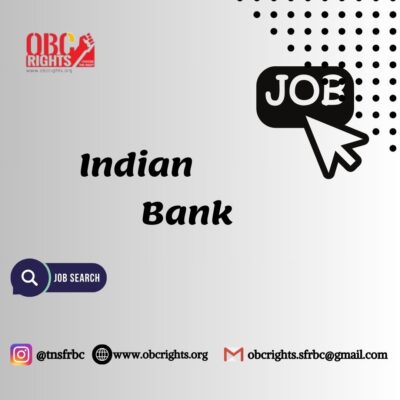The Indian Bank is a prominent public sector bank in India (PSU) that was nationalized and
operates under the Ministry of Finance, Government of India. It was founded in the year 1907, and its corporate
headquarters are located in Chennai, India.
Post and Eligibility of Indian Bank:
| Name of the post | Age limit | Education Qualification |
| Probationary Officer (PO) | 22 to 40 years | Candidates must hold a bachelor’s degree in any field from a recognized university or institute. |
| Clerk or Office Assistant | 22 to 40 years | Educational prerequisites usually involve a bachelor’s degree. In some instances, a 10+2 (Intermediate) qualification maybe accepted, but criteria can vary among banks. |
| Specialist Officer (SO) | 22 to 40 years | Educational qualifications can vary based on the specific role. Common positions like IT Officer, Marketing Officer, Law Officer, and Agricultural Field Officer may require a bachelor’s degree in a relevant field. |
| Assistant Manager | 22 to 40 years | Typically, a bachelor’s degree in an appropriate field is required, but specific criteria can vary based on the bank’s policies and the department applied to. |
| Branch Manager | 22 to 40 years | Candidates are expected to have a bachelor’s degree in a relevant field and a substantial background in the banking sector, typically with several years of experience. |
| Relationship Manager | 22 to 40 years | Educational requirements can vary, but a common prerequisite is for candidates to hold a bachelor’s degree in finance, business, or a related field. Higher-level roles may require additional qualifications. |
| Customer Service Executive | 22 to 40 years | Educational requirements can vary; some banks accept a 10+2 (Intermediate) qualification, while others may require a bachelor’s degree. |
| IT Officer | 22 to 40 years | For IT officer positions, candidates generally need a bachelor’s degree in computer science, information technology, or a related field. Higher-level IT roles may demand additional qualifications. |
| Risk Analyst | 22 to 40 years | To become a risk analyst, a bachelor’s degree in finance, economics, statistics, or a related field is typically necessary. Some employers may prefer candidates with advanced qualifications such as a master’s degree. |
| Credit Officer | 22 to 40 years | For Credit officer roles, candidates may need to hold a bachelor’s degree in finance, accounting, economics, or a closely related field. |
Selection process:
- Preliminary Examination: This is the first test to check basic knowledge and skills. It usually includes sections on English, Math, and Reasoning.
- Main Examination: If you pass the preliminary exam, you move on to a more detailed test that covers various topics. There might also be a written test, depending on the job.
- Interview: Candidates who do well in the main exam get called for an interview or group discussion. This helps the bank assess your communication and knowledge.
- Final Merit List: Your final selection depends on your performance in the main exam and interview. Different banks may weigh these differently.
- Document Verification: Once selected, your educational and personal documents are checked to confirm their genuineness and accuracy.
- Training: If you pass all stages, you’ll likely go through training before starting your job in the bank.
How to apply for Indian Bank Careers:
- Visit the official website.
- Scroll down the website to locate the “Careers” tab.
- Click on the “Careers” tab to access the page for Indian bank job vacancies.
- Review the information on the job vacancy page to learn about the available positions.
- To apply for Indian bank jobs or careers, click the “Apply” button to complete your registration.
Documents needed for verification:
- Remember to bring all necessary documents, including your mark sheets and original certificates, to the interview.
- It’s advisable to have copies of your report cards, certificates, and other essential documents with you.
- Carry recent passport-sized photographs.
- Don’t forget to bring your up-to-date resume.
- Ensure you have a proof of identity, such as an Aadhar card or Passport, handy for verification.

